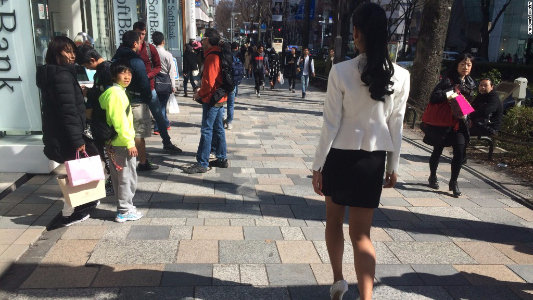A biracial beauty queen in Japan is facing criticism for not being Japanese enough.
Half-Japanese and half African-American, Miss Nagasaki Ariana Miyamoto is the first-ever mixed-race Miss Universe Japan.
Some say she doesn’t represent Japan’s demographic, while others champion the model, proud that she is overcoming racial hurdles and helping to expand the definition of what it means to be Japanese.
But changing perceptions here can be an uphill struggle. In a culture that typically prefers pale — where “pure Japanese” white skin is considered a symbol of beauty — the darker skinned Miyamoto’s crowning last week was a revolution on the runway.
On a walk through Tokyo’s Harajuku fashion district on Tuesday — the statuesque 20-year-old attracted stares, photo takers, and curious crowds.
With a Japanese mother and African-American father from Arkansas, Miyamoto is “haafu” — meaning half-Japanese.
Bullied for being different
In a country where around 98% of the population is considered to be the same race, this beauty queen says she was bullied for being different.
“In school, people used to throw garbage at me,” Miyamoto says — adding they also used racial slurs.
“People encounter discrimination and prejudice (in Japan),” says Jeff Kingston, a professor of Asian Studies at Tokyo’s Temple University.
He says that Japan has embraced mixed race entertainers and even athletes in recent years, but Miyamoto is the first to break the “beauty barrier.”
For a country that is often considered conservative and resistant to change, her crowning presents a different side of Japan internationally, he says.
“It sends a very positive message about the changing Japan to the rest of the world.”
Homogenous homeland
At home, though, many feel Miyamoto, who was born in Nagasaki, shouldn’t represent her homogenous homeland.
“No, she doesn’t even look Japanese,” says middle-aged shopper Ishiko Komagawa.
“Half is not 100% Japanese. If someone is chosen as Miss Japan, both her parents should be Japanese,” says high school student Tomoki Nogami.
Miyamoto says the criticism of her crown at home only makes her train harder for the global Miss Universe pageant in January.
“I want to tell the world, even a half-Japanese can represent Japan,” Miyamoto says.



